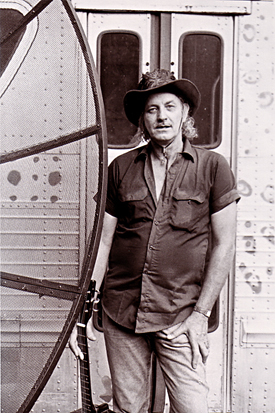Hasil Adkins: Difference between revisions
No edit summary |
No edit summary |
||
| Line 1: | Line 1: | ||
==Relevance== | ==Relevance== | ||
{{Page | {{Page | ||
|DiscogsArtistId=225401 | |DiscogsArtistId=225401 | ||
|WikipediaPageTitle=Hasil_Adkins | |WikipediaPageTitle=Hasil_Adkins | ||
}} | }} | ||
[[Category:Influences on Morrissey - Music]] | [[Category:Influences on Morrissey - Music]] | ||
[[Category:Songs used in pre-show]] | [[Category:Songs used in pre-show]] | ||
Revision as of 17:31, 6 January 2023
Relevance
Mentioned In
Discogs Information
Profile
American singer-songwriter and multi-instrumentalist, known for being an important precursor to the "psychobilly" genre. Born: April 29, 1937 in Boone County, West Virginia, United States Died: April 26, 2005 in Boone County, West Virginia, United States (aged 67)
Adkins was a self taught one man band, the reason for this was because when he first heard Hank Williams on the radio he didn't know there was a band behind Hank. He thought that Hank Williams played all the instruments. He claimed a repertoire of over 9000 songs including over 7000 original compositions. Recurring themes in Adkins' work include love, heartbreak, hunchin', police, death, decapitation, commodity meat, aliens, and chicken. His music has a shared appreciation by the likes of The Cramps and John Zorn.
External Links
- https://www.discogs.com/artist/225401-Hasil-Adkins
- https://en.wikipedia.org/wiki/Hasil_Adkins
- http://koti.mbnet.fi/wdd/hasil.htm
- https://hasiladkins.bandcamp.com/
Wikipedia Information
 |
Hasil Adkins (April 29, 1937 – April 26, 2005) was an American singer-songwriter and multi-instrumentalist. His genres include rock and roll, country, blues and more commonly rockabilly, and because of his unusual playing and singing style, he is often cited as an example of outsider music. He generally performed as a one-man band, playing guitar and drums at the same time. Adkins was born during the Great Depression and grew up in poverty. His spirited, unusual lifestyle is reflected in his music. His songs, which he began recording and distributing locally in the mid-1950s, explored an affinity for chicken, sexual intercourse, and decapitation, and were obscure outside of West Virginia until the 1980s. The newfound popularity secured him a cult following, spawned the Norton Records label, and helped usher in the genre known as psychobilly.